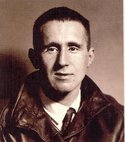Bertolt Brecht

Bertolt Brecht was a very influential director and playwright. Through his use of Epic Theatre he changed and influenced Theatre for many generations.
RESOURCES
BOOKS:
Brecht, B. (1978) Brecht on Theatre: The Development of an Aesthetic, ed and trans. John Willett, London: Methuen
Brestoff, R.(1995) The Great Acting Teachers and their Methods, A Smith and Kraus Book, USA.
Booker, P. (1988) Bertolt Brecht: Dialectics, Poetry and Politics, London: Croom Helm
Mitter, S. (1992) Systems of Rehearsal: Stanislavsky, Brecht, Grotowski, and Brook, London:Routledge
Mumford, M. (2009) Bertold Brecht, London: Routledge
Tourelle, L. & McNamara, M. (1998) Performance : A Practical Approach to Drama, Melbourne: Heinemann
WEBSITES
Brecht - Wikipedia
Brecht - Actor training - Routledge
BRECHTIAN TECHNIQUES - Mask; Design; Techniques
TECHNIQUES SLIDESHOW
Epic Theatre - Theatre Links
Brecht - Theatre Links
FIVE TRUTHS - link to HL Solo
STUDY GUIDES
Mother Courage Study Guide
Caucasian Chalk Circle Study Guide
Brecht's Key Theories
- GESTUS - to mean all or one of the following: socialised gesticulation as opposed to psychological facial expression; contextualised and alterable comportment; and the rhetorical artistic gestures of a performer.
- VERFREMDUNG - V- EFFECT - defamilarisation - Artistic strategies such as making lights, set and musicians visible; disrupting flow by narration, song and direct addressing and other techniques such as historicization.
- HISTORICIZATION - H - EFFECTS - presenting an event as a product of history; showing differences between part and present; guided by Marxist philosophy
- EPIC THEATRE - all those devices used to engage the SPECactor.
- DIALECTICS - the play of opposites as a tool for understanding by using his V effects.
- REALISM - Socialist realism - that formal experimentation was crucial to the pleasurable and historically specific mastery of contradictory social reality
VERFREMDUNGEFFECTS - V EFFECTS
- Narrating parts of the play rather than narrating them.
- Using songs to comment on action.
- Having actors interrupt the action of the play to speak directly to the audience, explaining or narrating events
- Having actors come onto stage carrying a placard announcing the time and place of the action or any other information.
- Having actors show their characters, rather than being wholly transformed into their parts.
- Retelling the story of the play with serval different endings.
- Not presenting an illusion of reality on stage.
(Tourelle & McNamara :1998)